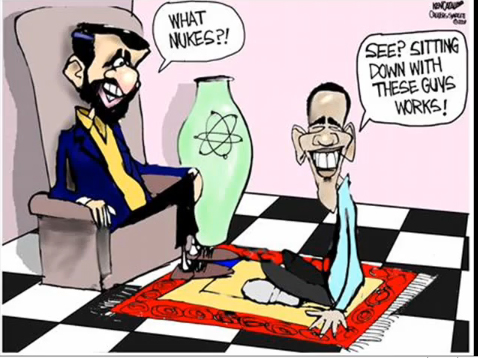The Drone of Obama's Appeasement
Barack Obama thinks no one can call him an appeaser because, after all, he ordered the execution of Osama bin Laden. While giving Obama points for the hit, Charles Krauthammer says not so fast, Barry (or words to that effect), citing Russian and Iran as two countries that have benefited from Obama's Chamberlainesque mien. In Iran, for example,
Obama imagined that his silver tongue and exquisite sensitivity...would persuade the mullahs to give up their weapons program. Amazingly, they resisted his charms, choosing instead to become a nuclear power. The negotiations did nothing but confer legitimacy on the regime at its point of maximum vulnerability (and savagery), as well as give it time for further uranium enrichment and bomb development.
For his exertions, Obama earned (a) continued lethal Iranian assistance to guerrillas killing Americans in Iraq and Afghanistan, (b) a plot to assassinate the Saudi ambassador by blowing up a Washington restaurant, (c) the announcement just this week by a member of parliament of Iranian naval exercises to shut down the Strait of Hormuz, and (d) undoubted Chinese and Russian access to a captured U.S. drone for the copying and countering of its high-tech secrets.
How did Obama answer that one?
On Monday, he politely asked for the drone back...
Well, he did say please. And everyone knows how well megalomaniacal totalitarians respond to politeness.



1 comment:
Obama can't help himself, ideologically. The real enemy, to him, is the mass of white Americans and their counterparts overseas (like Israelis). He _must_ reflexively take the side of the "Other," under the doctrine that "the enemy of my enemy is my friend." Of course, he is a shrewd enough politician to temper his tendencies with politically pragmatic gestures: thus, he did not pull immediately out of Iraq upon taking office--as he had implied he would, at least when talking to his base on the Left--and he even championed the continuation of the "good" war in Afghanistan during his 2008 Presidential campaign.
But look at what he didn't do: he had three years to reach a definitive agreement on the reduction of forces in Iraq that would have allowed the U. S. to maintain a large enough presence to give pause to Iranians in their drive to control the region (and eliminate Israel altogether, if convenient). And, for all that he talked up his commitment to "finishing the job" in Afghanistan, he refused to accept the level of forces that General McChrystal thought would be necessary to stage a successful surge in that country; not to mention that his Defense Department has saddled American troops there with rules of engagement that seem designed not to allow a clear military victory . . . shades of Vietnam (regarding which, I am sure, he is pleased that the "right" side won).
Post a Comment